
Bringing a new puppy into your home can be an exciting and joyful experience, but it can also be stressful for both you and your new furry friend. In order to make the transition as smooth as possible, it’s important to understand the potential risks of sleep deprivation in dogs and take steps to keep your puppy well-rested and comfortable.
A recent study conducted by Vib Faces, Inc. found that short-haired dogs that typically lie on their backs are most susceptible to sleep deprivation. Breeds such as Sheepdogs, Terriers, Lhasa Apsos, Akitas, and Dobermans also seem to be affected by sleep deprivation. The study found that 24% of short-haired dogs suffered from sleep deprivation and that, when deprived of sleep for two weeks, their sleep deprivation index was 57%. Furthermore, 19% of these dogs developed serious problems as a result.
It’s important to note that sleep deprivation in dogs is not caused by the amount of sleep they get, but rather by their sleeping position. It’s also important to be aware that sleep deprivation can affect dogs just like it affects humans. While researchers have not yet discovered a cure for sleep deprivation in dogs, veterinarians commonly recommend medication as an effective treatment.
Medications such as ice chips, non-prescription relaxers, pH balance relaxers, certificates, dental relaxers, and sedatives can be highly effective in bringing your dog out of a sleep-deprived state. However, it’s important to be aware of the potential side effects of these medications, and to consult with your veterinarian before administering any treatment.
Additionally, natural remedies such as Aloe vera and Devil’s claw, which have been used for medicinal purposes for centuries, may also help reduce inflammation and improve sleep patterns in dogs.
If you are interested in adopting a Chinese Crested, please contact us to get on our waiting list and birth announcements.
